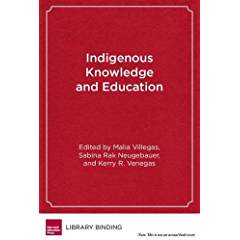Home » Resources » Scholarship on Teaching » Indigenous Knowledge and Education: Sites of Struggle, Strength, and Survivance
Scholarship
March 29, 2017
Indigenous Knowledge and Education: Sites of Struggle, Strength, and Survivance

- Author
- Malia Villegas, Sabina Rak Neugebauer, Kerry R. Venegas, eds.
- Publisher
- Harvard Educational Review, Cambridge, MA
This book brings together essays that explore Indigenous ways of knowing and that consider how such knowledge can inform educational practices and institutions.
Indigenous Knowledges is resiliently local in character and this poses a distinct contrast to the international, more impersonal system of knowledge prevalent in Western educational institutions. In the words of Mi'kmaq scholar Marie Battiste - a leading proponent of Indigenous Knowledge and a contributor to this volume - Indigenous Knowledge expresses "the vibrant relationships between the people, their ecosystems, and the other living beings and spirits that share their lands." Indigenous Knowledge and Education argues that such knowledge has much to offer schools and students in the United States and beyond.
This volume examines a wide range of Indigenous cultures and educational settings, including Native American, Haitian, Mexican, African, and Australian. Uniting all are three themes exemplified by many Indigenous cultures: struggle, strength, and survivance--the later a notion of survival that emphasizes remembrance, regeneration, and spiritual renewal Each of these themes is explored in a rich array of articles and capped with new essays by Marie Battiste, Gregory A. Cajete, and Bryan McKinley Jones Brayboy.
A wide-ranging and persistently stimulating volume, Indigenous Knowledge and Education casts contemporary theories and debates about education in a new--and essential--light. (From the Publisher)
Indigenous Knowledges is resiliently local in character and this poses a distinct contrast to the international, more impersonal system of knowledge prevalent in Western educational institutions. In the words of Mi'kmaq scholar Marie Battiste - a leading proponent of Indigenous Knowledge and a contributor to this volume - Indigenous Knowledge expresses "the vibrant relationships between the people, their ecosystems, and the other living beings and spirits that share their lands." Indigenous Knowledge and Education argues that such knowledge has much to offer schools and students in the United States and beyond.
This volume examines a wide range of Indigenous cultures and educational settings, including Native American, Haitian, Mexican, African, and Australian. Uniting all are three themes exemplified by many Indigenous cultures: struggle, strength, and survivance--the later a notion of survival that emphasizes remembrance, regeneration, and spiritual renewal Each of these themes is explored in a rich array of articles and capped with new essays by Marie Battiste, Gregory A. Cajete, and Bryan McKinley Jones Brayboy.
A wide-ranging and persistently stimulating volume, Indigenous Knowledge and Education casts contemporary theories and debates about education in a new--and essential--light. (From the Publisher)